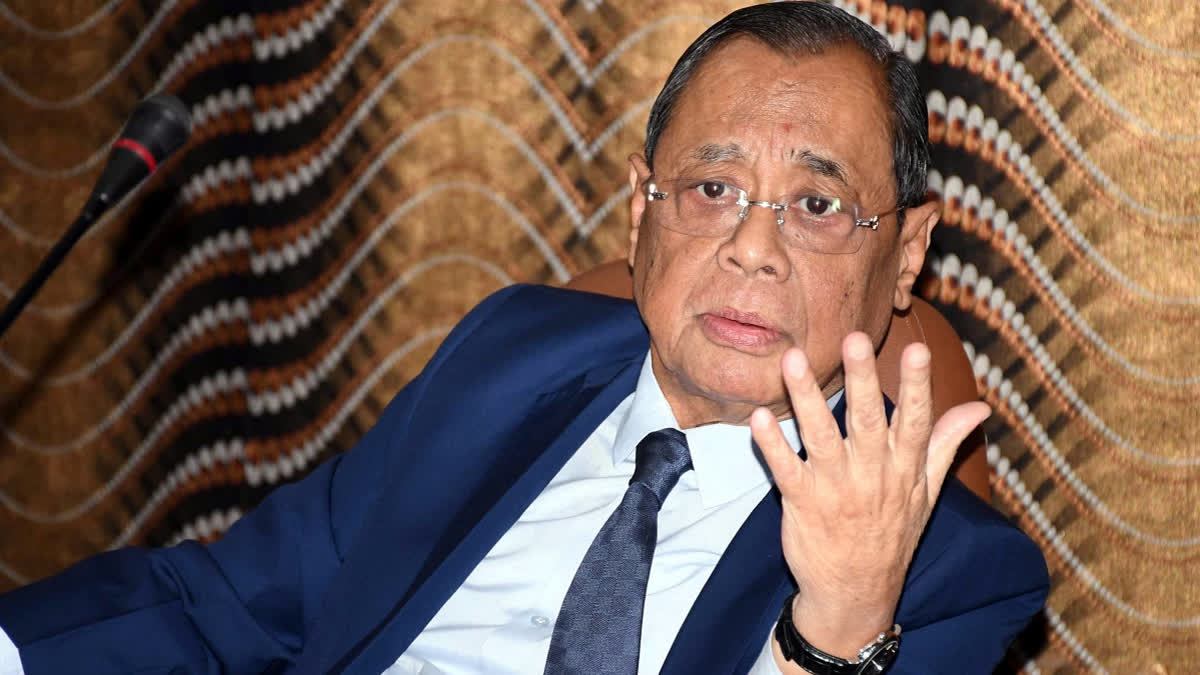Surat: The proposed Uniform Civil Code (UCC) is a “very important” step towards national integration and social justice, however, there is a need to build consensus before its implementation, former Chief Justice of India Ranjan Gogoi said on Sunday.
Gogoi, who was speaking at the 'Surat Litfest 2025' in Gujarat's Surat, supported the ‘One Nation, One Election’ idea and said frequent polls affect governance, strain the administration and finance, and cause election fatigue.
“I see Uniform Civil Code as a very progressive piece of legislation which will replace diverse customary practices that have evolved into laws,” the ex-CJI who is a Rajya Sabha MP now said. "There is no debate that it is a constitutional goal and is in Article 44," said Gogoi.
If implemented, UCC would establish a single set of personal laws for all citizens, regardless of their faith. It would apply to matters like marriage, divorce, adoption, inheritance, and maintenance.
A uniform civil code in India has been a key agenda of successive election manifestos of the ruling BJP. “Now, I think it is a very important step towards national integration to achieve social justice, and let us be clear on one thing – it does not come into conflict with Articles 25 and 26, which is the right to religion,” he said during a session where he discussed various issues with Prafulla Ketkar, the editor of RSS mouthpiece Organiser.
Gogoi said the UCC is working wonderfully in Goa. What needs to be done is “consensus building and check misinformation”, he said. According to Gogoi, the 46th CJI, UCC has nothing to do with religion. Even the Supreme Court, in five matters, starting with the Shah Bano case, concerning the right of Muslim women to seek maintenance, has opined that the government must get it on board, he said.
The civil code is a way to bring the nation together and tackle the pendency of cases caused by various laws governing civil and personal matters, affecting social justice, he said. “But I would request the government and the Parliamentarians... don’t rush into it. Build up a consensus. Tell the people of this nation what UCC really is. And then, once you build the consensus, people understand. One section of people will never understand, they will pretend not to understand," he said.
On the ‘One Nation, One Election’ proposal, Gogoi said former President Ram Nath Kovind had sought the opinion of 4-5 former CJIs, including him, and he supported the idea. “The number one reason why I support it is governance. Every year some election is going on ...Every year the country gets into election mode, which means MCC (mode code of conduct). The ministers have to perform their electioneering duties and the administration stops. All these affect governance,” he said.
Money is spent by political parties and the administration in some states is caught up in election duties for six months every year, he said. Election fatigue due to frequent polls is among the other reasons why he backs the idea, Gogoi said. The ex-CJI called the huge pendency of cases plaguing the judiciary a solvable problem, but rued that “nobody seems to be interested in doing anything about it”.
With 5 crore pending cases, there are 9 crore litigants, and with each having a family of five, 45 crore Indians are stuck in legal cases, he said. “Has anybody realised this? Has this issue been raised in any forum,” the Rajya Sabha member asked. The judicial system is not about collegium, which has the power of appointment, said Gogoi, adding that about 45 crore Indians are stuck in perpetual litigation and one doesn’t have to wait till 2047 to find a solution. “You have to get it tomorrow,” he stressed.
Discussions about the judiciary on any forum and in the media revolve around the collegium system of appointment, the power of the judiciary, its overreach, and who is supreme between Parliament and the judiciary, but not pendency of cases, he said. “How to resolve the pendency of 5 crore cases has not been discussed, no white paper has been published, and nobody seems to be, pardon me, interested. But, to my mind, it is a solvable problem, and I think the head of the judicial family, the Chief Justice of India, should take the initiative,” he said.
He emphasised the need to get “good people” to become judges to improve the justice delivery system. “There are 24,000 judges in the country. Raise this to one lakh and get good people out of 140 crore. People who mean business. You have never endeavoured to find out what this man's true character is. Is he compassionate, kind? Is he a good man? Does he have a mission in life,” he asked.
As far as the new criminal laws are concerned, they have both “good and bad features”, Gogoi said. Some of the positive features are provisions of community service for petty offences, some crimes being made gender neutral, setting up of a director of prosecution in every district, and expert evidence getting more credence, he said. (Agency inputs)
Read More



